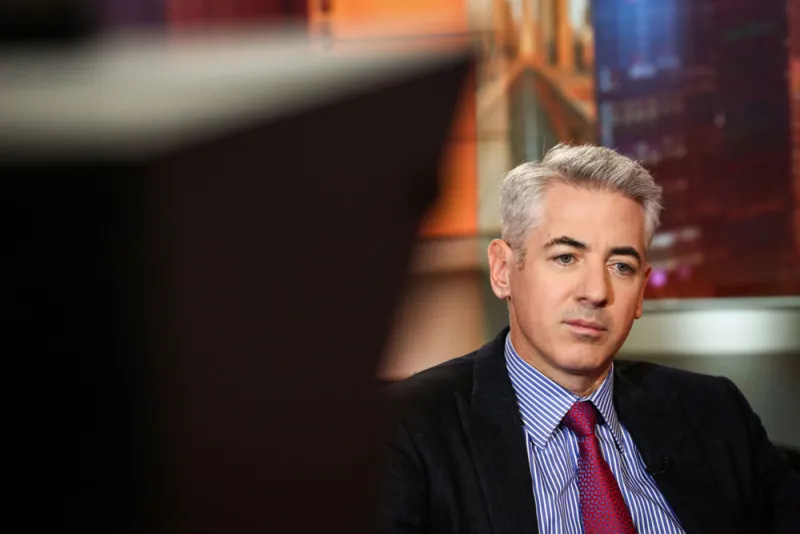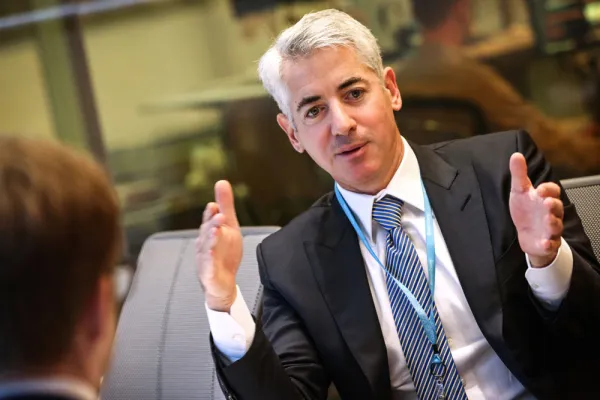Since 2003, only 90 SPACs, or special purpose acquisition corporations, have been liquidated, but soon there may be one more: Bill Ackman’s $4 billion Pershing Square Tontine Holdings.
Ackman told shareholders Thursday night that he plans to dissolve Tontine, the largest SPAC ever launched, give investors their money back, and offer them warrants on a new security he has developed that is a twist on the SPAC format.
It’s all contingent on approval from the Securities and Exchange Commission and the New York Stock Exchange, which he hopes to have soon.
The news was a shock to investors who’ve endured a series of disappointments surrounding Ackman’s SPAC that, as Institutional Investor has reported, left many of them with heavy losses. The stock tumbled from its peak of $34 earlier in the year and finally went below $20, its IPO price, for the first time Thursday.
In a letter to shareholders, Ackman said his latest effort was driven by a lawsuit filed against Tontine earlier this week that, while “without merit,” could still “deter potential merger partners” until it is resolved.
If successful, the lawsuit would “imply that every SPAC may also be an illegal investment company” and have a “chilling effect” on the entire SPAC market, he said.
So far, many investors seem to be giving Ackman the benefit of the doubt.
Tontine’s stock fell below $20 Thursday, an indication that investors believed he would not be able to consummate a merger. But while some investors have grown wary of Ackman’s constantly shifting plans, there was no mass selling of shares on Friday. Indeed, the stock ticked up slightly during the morning and is unlikely to go much below $20, given the redemption value of $20 per share in the offing. It hovered around $19.80 at midday.
Some investors, tired of waiting, told II that they would prefer Tontine be liquidated now instead of waiting around for his new vehicle, Pershing Square SPARC Holdings, to be approved by regulators.
Pershing Square filed its registration for SPARC in June and has already received a comment letter from the SEC. “We believe we can address the disclosure and other issues that have been raised by the SEC staff,” he told investors. He added that the listing of the SPARC warrants on the NYSE would require a rule change that is also subject to SEC approval, that he is also working to obtain.
If all goes well, a prospectus for the SPARC could be filed “within the next several weeks,” according to an individual familiar with Ackman’s plans.
Shareholders in Tontine would then have to vote on its dissolution before they get their $20 per share back and receive SPARC warrants.
The primary difference between Ackman’s SPARC and a traditional SPAC is that the SPARC does not require investors to put up any money until it has identified a merger target. Unlike a SPAC, there is not a two-year time limit on finding a target — something that Ackman likes.
The lawsuit may have given the hedge fund manager “cover” to unwind his SPAC at a time when finding a partner is proving difficult, Joel Rubinstein, a partner at White & Case who works on SPACs, told II.
A glut of SPACs has left hundreds of them searching for a merger partner, and Ackman only has 11 months left to find one.
Rubinstein said he also thinks the lawsuit is without merit, especially now that Ackman’s SPAC has abandoned plans to invest in Universal Music Group.
The lawsuit’s main argument is that Tontine is an illegal investment company because it invests in securities. It did plan to buy Universal shares in that company’s IPO, but that plan was nixed under pressure from the SEC. Now the only securities Tontine holds — in trust — are Treasuries and money market funds that hold Treasuries. All SPACs do the same.
As Ackman explained, “The two law professors who concocted the legal theory behind the complaint conceded to the press that their motivation in bringing the lawsuit was ‘to reform’ the entire SPAC industry.”
One of the professors who is leading the suit, Robert Jackson, served as an SEC commissioner between January 2018 and January 2020, Ackman noted. During his tenure, the SEC okayed more than 100 SPAC IPO registration statements and oversaw dozens of merger transactions, he added.
“If Mr. Jackson is so sure that SPACs are in fact illegal investment companies, why didn’t he take steps to shut them down while he was an SEC commissioner?” asked Ackman.
This lawsuit may not be the end of Tontine’s legal troubles, however. Several class-action attorneys are looking to make a case against Ackman and his SPAC, and some aggrieved investors told II they are tempted to give it a shot.







